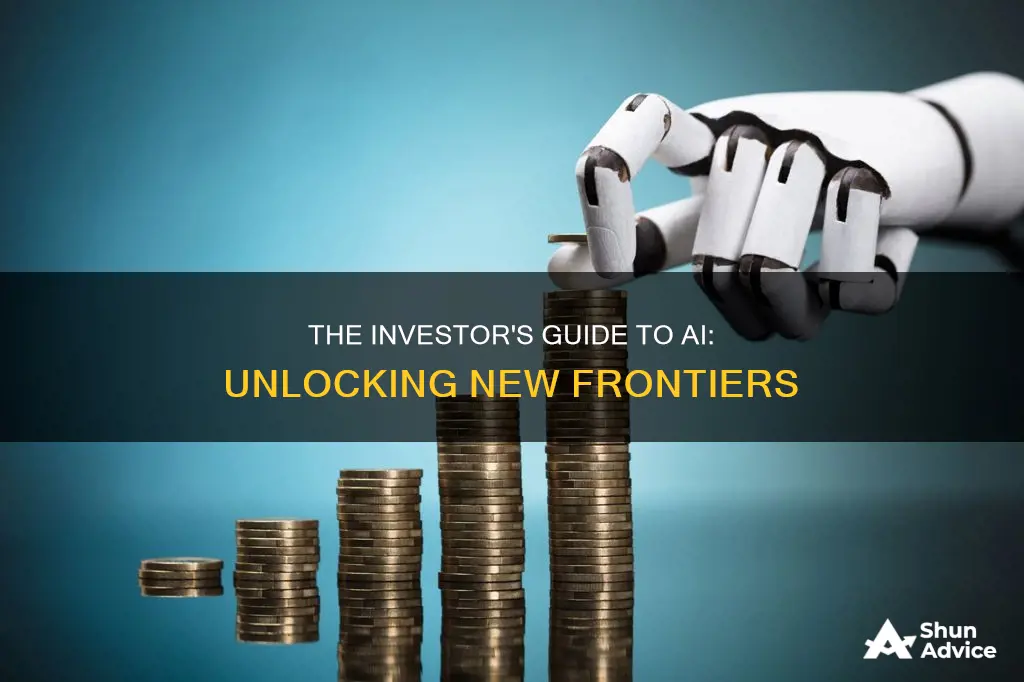
Artificial intelligence (AI) is already transforming the world of investing, from the use of AI-powered chatbots as teaching tools to the utilization of natural language processing (NLP) to analyse millions of articles and identify changes in public sentiment. AI has the potential to revolutionize investing by providing data-driven and logical decisions, improving operational efficiency, enhancing customer experience, and managing risk. However, the high cost of adoption and the complexity of integrating AI with human investors' knowledge present significant challenges. While AI will not replace human advisors anytime soon, investment firms that embrace AI will likely gain a competitive edge, as investors express a preference for companies that leverage this technology.
| Characteristics | Values |
|---|---|
| Decision-making | AI can make decisions based on data and logic, removing human emotions from the equation |
| Market trend prediction | AI can predict future market trends by analysing previous trends, world affairs and the weather |
| Fraud detection | AI is used by financial regulatory bodies to detect fraud |
| Customer service | AI improves customer service by reducing waiting times and helping customers solve their problems quickly |
| Document analysis | AI can quickly analyse large volumes of documents |
| Risk management | AI can assess investment risk and help keep investors from acting impulsively |
| Data analysis | AI can process large volumes of data almost instantly and make predictions |
What You'll Learn

AI's ability to conduct thorough investment analysis
AI has the potential to revolutionise investing, and its ability to conduct thorough investment analysis is a key reason why.
AI can conduct investment research and analyse stocks and ETFs more comprehensively than humans. It can use natural language processing (NLP) to comb through millions of articles and other content sources to identify changes in public sentiment or interest. This helps to resist human impulses to act on a piece of negative or positive news about a company.
AI can also assess an investment's riskiness and help keep investors from acting impulsively. It can weigh investments so that money is allocated in a way that corresponds with the investor's risk tolerance. This is done through something called Portfolio Protection, which takes into account factors like interest rate risk, oil price risk, and volatility risk.
AI can also be used to predict future market trends based on previous ones, and it can even take world affairs and the weather into account. However, it will never be flawless as the stock market is still ruled by human factors to an extent.
AI is already being used by investment firms to transform their business models, operations, and internal capabilities. However, the cost of adoption is exceptionally high, and it will be some years yet before we will be able to rely on AI to make investing decisions.
Who Manages Their Own Investments?
You may want to see also

AI's role in improving customer experience
AI is set to play a significant role in improving the customer experience in the world of investing. Here are some ways in which AI can enhance the customer experience:
Improved Customer Service
AI-powered chatbots and virtual assistants are revolutionising customer service by providing instant, 24/7 support. These tools use natural language processing (NLP) to understand and respond to customer inquiries in real time, reducing wait times and improving the overall quality of customer service. This leads to enhanced customer satisfaction and a positive perception of the brand.
Personalised Customer Interactions
AI can analyse customer data to create personalised interactions and offer tailored recommendations and solutions. By understanding individual preferences and behaviours, businesses can deliver a more customised experience, fostering a stronger connection between the brand and the customer.
Enhanced Decision-Making
AI improves real-time and predictive decision-making, helping brands provide a hyper-personalised customer experience and foster deeper customer-brand connections. AI can analyse large amounts of data and make data-driven decisions quickly and accurately, resulting in improved outcomes for customers.
Efficient Purchasing Processes
AI ensures a seamless and efficient purchasing experience through personalised product recommendations and streamlined order processing. This enhances customer satisfaction and increases sales and revenue for businesses.
Alleviating Team Burnout
AI can automate routine tasks and handle repetitive inquiries, allowing human support agents to focus on more complex and meaningful interactions. This strategic allocation of tasks ensures that employees can provide exceptional service without burning out.
Consistent Cross-Channel Support
AI maintains uniformity in customer service across various channels, such as chat, email, and social media. This consistency strengthens the brand image and fosters trust among customers.
Optimised Email Communications
AI can optimise email communications by tailoring the content and ensuring strategic optimisation for enhanced engagement.
While AI offers numerous benefits for improving the customer experience, it is essential to balance its use with human interaction. Maintaining the human element in customer engagement is crucial for effective customer connections and empathy.
Retirement Investing: Should You Continue to Play the Long Game?
You may want to see also

AI's impact on the future of financial advisors
AI is set to have a profound impact on the future of financial advisors and the world of investing. While it is already being used in the financial sector, its adoption for investing purposes is still in its early stages. AI has the potential to transform the way financial advisors work, providing them with tools to make more informed and educated decisions.
One of the biggest advantages of AI in investing is its ability to remove emotions from financial decision-making. AI can make choices based on data and logic, reducing the risk of human error. It can also analyse a vast amount of data quickly, including news articles, market trends, and world events, to predict future market trends and identify investment opportunities. This technology can be particularly useful in risk management and portfolio diversification.
AI can also improve the customer experience by enhancing operational efficiency and reducing waiting times. It can be used to provide customers with more tailored advice and improve the accuracy of financial predictions. This can lead to increased customer satisfaction and retention, giving investment firms that adopt AI a competitive edge.
However, the cost of AI adoption is high, and it requires significant investment in new tools, staff training, and large datasets. As a result, smaller investors may be priced out of the market in the short term. There are also concerns about the accuracy and ethical implications of AI, with some models still prone to making mistakes or misinterpreting information.
While AI has the potential to revolutionize the work of financial advisors, it is not expected to replace humans anytime soon. Instead, it will likely act as a valuable assistant, helping advisors provide better service to their clients. Human advisors will continue to play a critical role, especially in providing the face-to-face interactions that customers still prefer and value.
People-Centric Investments: Key to Success
You may want to see also

AI's limitations and ethical considerations
While AI has the potential to revolutionize investing, it also comes with limitations and ethical considerations. Here are some key points to consider:
- Data Quality and Bias: AI in investing is heavily reliant on data quality. If the AI model is trained on flawed, biased, or incomplete data, it can lead to inaccurate predictions and decisions. This limitation was highlighted in the recent ChatGPT controversy, where the AI model provided inaccurate and biased responses due to its training data.
- Human Oversight: Despite AI's capabilities, human oversight is still crucial. AI can assist in analyzing data and making predictions, but human experts are needed to interpret results, identify biases, and make complex decisions that require ethical judgment. Human advisors are also preferred by customers, ensuring a continued role for human guidance in investing.
- Adverse Selection: AI-driven investing may advantage larger investors who can afford the technology. Smaller investors could be left behind, creating a two-tiered market where those with access to AI have an unfair advantage. This could lead to increased wealth inequality and market distortions.
- Job Displacement: The increased use of AI in investing raises concerns about job displacement for human financial advisors and analysts. While AI is expected to complement rather than replace humans entirely, there may still be a significant impact on employment in the industry.
- Ethical and Legal Considerations: AI in investing raises ethical questions, such as the potential for algorithmic bias, privacy concerns, and the explanation of AI-driven decisions to affected individuals. Additionally, regulatory and legal frameworks may need to adapt to address the unique challenges posed by AI, ensuring fair competition, data privacy, and consumer protection.
- Black-Box Decision-Making: AI models, particularly those using complex machine learning algorithms, can be seen as black boxes. Understanding why an AI model made a particular decision can be challenging, requiring new approaches to ensure transparency and accountability in the investment process.
- Market Volatility: While AI can improve market efficiency, there are concerns about its potential impact on market volatility. AI models trained on similar data may lead to herd behavior, amplifying market movements. Additionally, the use of AI by high-frequency traders could increase market fragility and the risk of flash crashes.
In conclusion, while AI has the potential to significantly impact the investing landscape, it is essential to recognize its limitations and ethical implications. Careful consideration of these factors will be necessary to harness the benefits of AI while mitigating potential risks and ensuring a fair and transparent investment environment.
The Cost of Emotional Investment
You may want to see also

AI's influence on the investment landscape
Artificial intelligence is already having a profound impact on the world of finance and investments, and its influence is only expected to grow in the coming years. AI is being leveraged by financial institutions to improve their operations, enhance customer service, and make more informed decisions.
Improved Operational Efficiency
AI, along with advanced automation, is being used by investment firms to enhance their operational efficiency. This includes automating repetitive tasks, streamlining loan applications, and quickly processing large volumes of documents. AI solutions can also make intelligent decisions based on the parameters set by humans, reducing the workload for human employees.
Enhanced Decision-Making
One of the most significant advantages of AI in investing is its ability to remove emotions from financial decisions. AI can make choices based on data and logic, reducing the likelihood of errors. AI can analyze vast amounts of data from various sources, including news articles, market trends, and world events, to predict future market trends and make more informed investment decisions.
Risk Management
AI is also a game-changer for risk management in investments. It can assess investment risk, identify factors influencing stock performance, and help in portfolio diversification. AI models can consider various risk factors, such as interest rate risk, oil price risk, and volatility risk, to optimize returns and manage risk.
Customer Experience
Investment firms are using AI to improve the customer experience by generating more insights, customizing content, and delivering information to clients faster and more efficiently. AI-powered chatbots and virtual assistants are also being used to provide personalized financial advice and enhance customer interactions.
Identifying Investment Opportunities
AI is not only transforming how investments are made but also impacting the investment opportunity set. AI-driven tools can identify winners in the new era of AI, with markets rewarding a small subset of AI innovators. This is expected to lead to the wider integration of AI in business models across various industries.
Limitations and Challenges
While AI has numerous benefits for the investment landscape, there are also some challenges and limitations. The cost of AI adoption is exceptionally high, and smaller investors may struggle to access AI tools in the early stages. Additionally, AI in investing is still in its early days, and there is a limited playing field with not enough reliable data to judge its effectiveness fully.
In conclusion, AI is already influencing the investment landscape by improving operational efficiency, enhancing decision-making, and transforming customer experiences. However, the full potential of AI in investing is yet to be realized, and it will likely take several years for AI to become a mainstream tool for investors of all sizes.
Planning for the Golden Years: Strategies for Late-Start Retirement Investing
You may want to see also
Frequently asked questions
AI will be revolutionary for investing, but it won't replace human investors anytime soon. AI can be used to predict future market trends based on previous ones, and it can take world affairs and the weather into account. However, the stock market is still ruled by human factors to an extent, and AI is prone to making mistakes if it has been fed flawed data.
AI can process large volumes of data almost instantly and make decisions based on that data without the emotional fallibility of human investors. AI is also being used to improve customer service efforts, shorten waiting times, and help customers solve their problems quickly.
AI adoption rates are currently slow because the technology requires a large investment in new tools, staff training, and data. AI is also prone to making mistakes if fed flawed data, and it is still developing, so it is not yet clear what it will be capable of in terms of investment advice.







